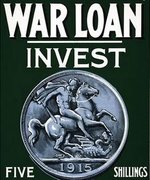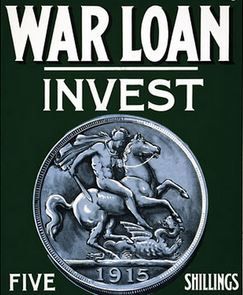Part of The World War I debt, known as The War Loan, is to be paid back, the UK government announced on Wednesday. A total of £1.94 billion ($3.04 billion) will be repaid on a debt that was raised at the start of WWI.
The War Loan will be paid back in full on March 9th, 2015.
The U.K.’s Debt Management Office (DMO) said the 3.5% War Loan may be redeemed at par either by a single operation or successive ones on December 1st, 1952, or any subsequent date, subject to the Government announcing its intention in the London Gazette three months beforehand. “A formal notice to this effect will be published in the London Gazette on Monday 8th December,” the DMO wrote.
The DMO said in a statement on Wednesday:
“3½% War Loan has £1,938.6 million (nominal) in issue and is by far the largest of eight outstanding undated gilts remaining in the gilt portfolio. 3½% War Loan itself accounts for 75% of the total stock of undated gilts (which together total £2.59 billion and comprise 0.2% of gilt portfolio).”
A British publicity label from World War I aimed at raising funds.
The debt, unlike typical bonds that have a fixed maturity date, is undated. This means the government can chose when to pay it back. It even has the option of never repaying investors.
The 3.5% War Loan has over 120,000 holders, or sixty percent of all government gilts holdings. Approximately 97,000 of these investors have war bonds worth less than £1,000, and 38,000 have bonds worth up to £100.
In 1932, Chancellor Neville Chamberlain issued the 3.5% War Loan in exchange for the 5% War Loan 1929-1947, which was issued in 1917 as part of a program to raise funds to pay for WWI.
Since 1917, the DMO estimates that the UK has repaid about £5.5 billion in total interest of the 5% and 3.5% war loans.
Current Chancellor of the Exchequer George Osborne said:
“This is a moment for Britain to be proud of. We can, at last, pay off the debts Britain incurred to fight the First World War. It is a sign of our fiscal credibility and it’s a good deal for this generation of taxpayers. It’s also another fitting way to remember that extraordinary sacrifice of the past.”


